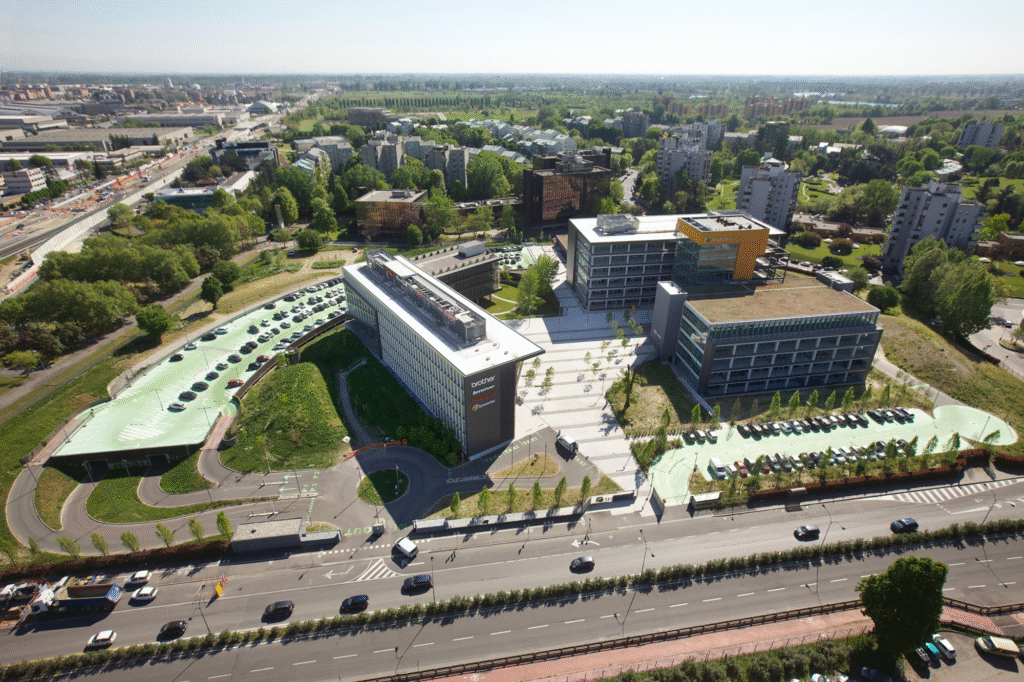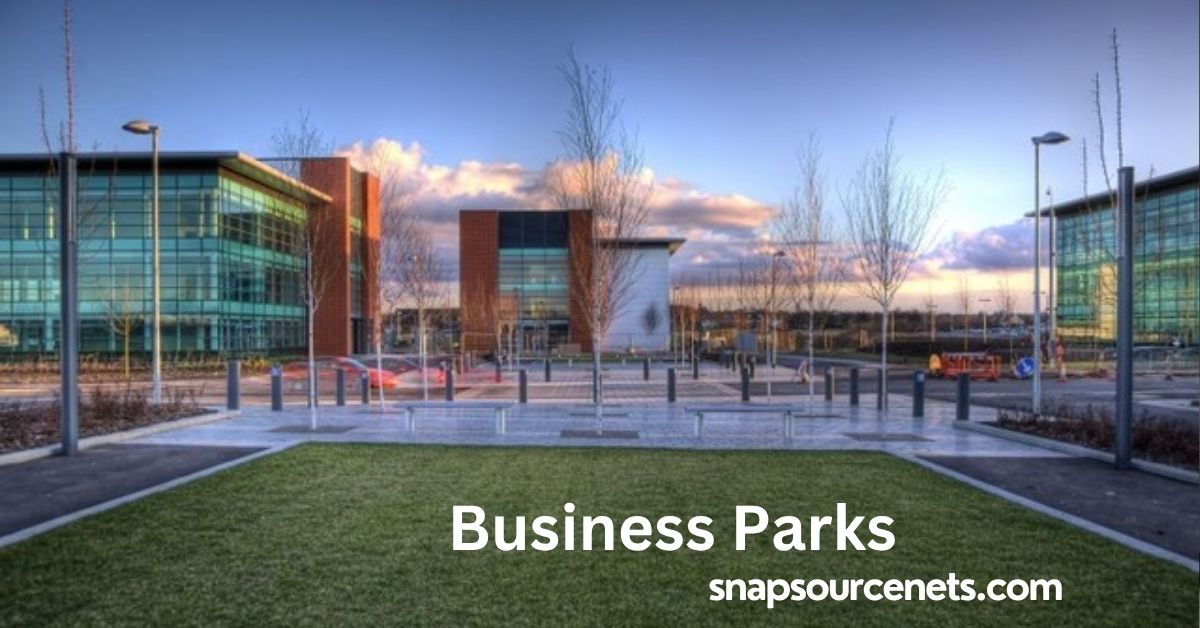Business Parks: Everything You Need to Know
A business park is a specially designed area that houses a variety of commercial and business enterprises. It is a location that brings together multiple companies, offering a range of office buildings, retail spaces, industrial units, and more. These parks are typically situated in the suburbs of major cities or in rural areas to provide businesses with ample space, lower costs, and a conducive environment for growth. Business parks have become a vital aspect of urban and economic development, helping businesses thrive while contributing significantly to the local economy.
In this article, we will explore the concept of business parks in-depth, discussing their types, benefits, and challenges, along with their role in modern economic growth. Additionally, we’ll take a look at the factors that make business parks an attractive option for businesses and their contribution to job creation and community development.
What is a Business Park?
A business park refers to a specially planned area designed to accommodate multiple businesses. These parks are usually designed with various infrastructures, including office buildings, industrial complexes, retail centers, and parking spaces. Located outside city centers, business parks offer affordable rental options compared to downtown areas while maintaining easy access to key transportation routes, highways, and essential services.
The concept of a business park is to create a strategic environment that fosters innovation, collaboration, and operational efficiency. Business parks are typically designed with zoning regulations that allow for a variety of industries, from tech startups and manufacturing units to logistics and distribution centers.

The Key Features of a Business Park:
- Cluster of Businesses: A business park brings together businesses from various sectors in one area, fostering synergies, networking opportunities, and potential collaborations.
- Prime Location: They are typically located in suburban or rural areas but are still accessible to major highways and transportation networks.
- Cost-Effective: Business parks are often more affordable for businesses compared to locations in city centers, offering lower rental rates and overhead costs.
- Infrastructure and Amenities: Business parks are equipped with all necessary infrastructure, including high-speed internet, parking spaces, security, and common facilities like cafeterias and gyms.
- Room for Growth: Business parks are designed to accommodate businesses of varying sizes, making them ideal for startups, SMEs, and large corporations looking for scalability.
Types of Business Parks
Business parks can be classified into several types depending on the nature of the businesses they house, their location, and the infrastructure provided.
1. Technology Parks
These parks are designed to accommodate technology-focused businesses, such as startups, software companies, and R&D institutions. They often provide specialized infrastructure, such as high-speed internet connections, lab spaces, and collaboration hubs to encourage innovation. Technology parks are often located near universities, research institutions, or major tech hubs.
2. Industrial Parks
Industrial parks cater to manufacturing, logistics, and distribution businesses. These parks feature large buildings and open spaces for warehouses, factories, and assembly lines. They are typically located near transportation routes like highways, ports, or rail stations for efficient goods distribution.
Also Read: #milestoneareacom/: The Ultimate Platform for Project Management and Milestone Tracking
3. Office Parks
Office parks primarily consist of office buildings for corporate tenants. These parks are designed to house professional service firms, financial institutions, and other service-oriented businesses. Office parks often offer flexible office spaces, from small individual offices to large corporate headquarters.
4. Mixed-Use Parks
A mixed-use business park combines a variety of business types, such as office spaces, retail, and industrial facilities, into a single location. These parks are designed to cater to multiple industries and are typically located near major urban areas or transportation hubs.
Why Are Business Parks Important?
Business parks play a crucial role in the economic development of both local communities and national economies. Here’s why they are important:
1. Fostering Economic Growth
By providing businesses with a cost-effective and well-organized environment, business parks stimulate economic growth. They attract both small businesses and large corporations, which in turn generate jobs, increase tax revenues, and contribute to the local economy. In some cases, business parks can become hubs for particular industries, driving innovation and attracting additional investment.
2. Creating Jobs and Employment Opportunities
One of the primary advantages of business parks is their ability to create employment opportunities. With multiple businesses operating in one location, a business park offers jobs in a wide range of sectors, from administrative roles to specialized technical positions. Furthermore, business parks can encourage the development of local talent and foster the growth of small businesses and startups.
3. Promoting Sustainability
Many modern business parks are designed with sustainability in mind. They implement eco-friendly practices, such as energy-efficient buildings, renewable energy sources, and waste management systems. This makes them attractive to companies focused on sustainability and corporate social responsibility (CSR).
4. Encouraging Innovation and Collaboration
Business parks foster collaboration by bringing together companies from diverse industries. Shared spaces, resources, and networking opportunities allow businesses to connect, collaborate, and innovate. In technology parks, for example, businesses can work closely with research institutions, universities, and other tech startups to develop new products and services.
Benefits of a Business Park
There are numerous benefits to businesses that choose to operate in a business park. Below are some of the key advantages:
1. Cost-Effective Operations
Operating in a business park often proves more affordable compared to renting space in a downtown area. Businesses can save on rent, property taxes, and utilities, making business parks an attractive option for startups and small enterprises with limited budgets.
2. Access to Infrastructure and Amenities
Business parks are equipped with state-of-the-art infrastructure and essential amenities. This includes high-speed internet, ample parking, maintenance services, and security. The availability of these resources helps businesses focus on their core operations without worrying about logistical concerns.
3. Networking and Collaboration Opportunities
One of the most significant advantages of being in a business park is the chance to network and collaborate with other businesses. Many business parks host events, conferences, and workshops that promote interaction between companies, enabling them to share ideas, knowledge, and resources.
4. Flexibility for Growth
Business parks provide businesses with the flexibility to scale their operations as needed. Whether a company is growing rapidly or looking to downsize, business parks offer a range of spaces and lease options that accommodate different business sizes and needs.
5. Better Access to Talent
Many business parks are located near major urban centers or educational institutions, making it easier for companies to tap into a large pool of skilled workers. This can be particularly beneficial for tech companies or firms that require specialized talent.
Challenges of Operating in a Business Park
While there are many advantages to operating in a business park, there are also some challenges that businesses may face:
1. Limited Branding Opportunities
Since business parks tend to house multiple companies, individual branding opportunities may be limited. Companies may struggle to stand out in a crowded business park, especially if the park itself lacks visibility or is not well-known.
2. Lack of Customization
Many business parks offer standardized office spaces and facilities, which may not meet the specific needs of all businesses. Companies looking for a highly customized workspace may find business parks limiting in terms of flexibility.
3. Zoning and Regulatory Restrictions
Depending on the location, businesses in a park may face zoning and regulatory restrictions. This can limit the types of businesses that can operate in certain areas or make it more challenging to expand operations.
Conclusion
Business parks have become an integral part of the modern economy, providing businesses with a cost-effective, flexible, and collaborative environment to thrive. By fostering innovation, offering networking opportunities, and providing essential infrastructure, business parks support the growth and success of both small and large businesses.
Whether you are a startup looking for affordable office space or an established company seeking room for growth, a business park can offer the resources and environment you need. With the added benefit of being located in easily accessible areas, business parks continue to be a driving force in the success of businesses worldwide.
Frequently Asked Questions (FAQs)
What types of businesses are best suited for a business park?
Business parks are ideal for a wide range of businesses, including technology firms, manufacturing companies, service providers, and logistics companies. Depending on the type of business park, companies can find spaces tailored to their specific needs.
Are business parks only located in suburban areas?
While many business parks are located in suburban areas, some are also found in rural or even urban settings. The key is their accessibility to transportation networks, making it easy for businesses to operate efficiently.
How can a business park help my company grow?
Business parks provide businesses with affordable space, networking opportunities, and access to essential resources. This supportive environment enables companies to focus on their core operations while benefiting from shared services and collaboration.
Can startups benefit from business parks?
Yes, startups can benefit significantly from business parks. They offer affordable rental rates, flexible space, and access to networking opportunities, all of which are crucial for the growth of early-stage companies.
Do business parks offer sustainability features?
Many modern business parks incorporate sustainability features such as energy-efficient buildings, renewable energy sources, and waste management systems, making them attractive to environmentally conscious businesses.
editor's pick
latest video
news via inbox
Nulla turp dis cursus. Integer liberos euismod pretium faucibua





